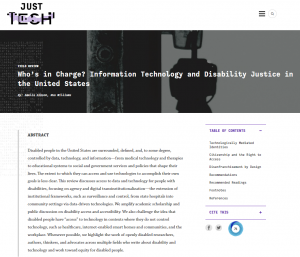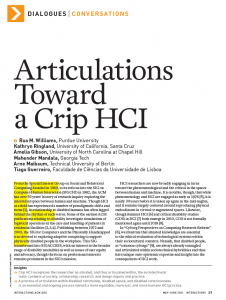Projects and Studies
This toolkit introduces students and library workers to prominent people and public discourses among (and about) disabled people online, in literature, and in the news
Most people will experience a disability during their lifetime. Libraries and other public organizations must be equipped to serve disabled people of diverse ages, genders, and races/ethic groups with inclusive and accommodating spaces, services, programing, and policies. CEDI built this tool kit to help library workers learn more about disability equity and inclusion, and understanding the needs of disabled community members.
Toolkit modules offer resources and facilitate thought and discussions about intersectional disability inclusion in libraries. Each module includes reflection points and exercises that will help you think through the some of the mechanics of building more inclusive library spaces and programs. Although this toolkit is primarily focused on working with the community, some of the topics will also touch on issues related to disabled library workers.
This project funded and supported by IMLS and the Durham Public Schools Foundation HOPE Network was a collaboration with the Durham Public Schools Exceptional Children Services, the DPS foundation, the Exceptional Children’s Assistance Center (ECAC), the Durham Special Needs Advisory Council (DSNAC), and the Durham County Library was a collaboration to build more equitable access to curricula and resources for students with disabilities and their families during COVID-19 emergency online learning. The team acted as an advisory/liaison group and collaborated to survey family and student needs during the transition online, creating technology literacy training, and producing examples of accessible materials.
Posters and Presentations
March, L., & Gibson, A.N. (2020). Disabled People Use the Internet! Building and Maintaining Inclusive Library Spaces Online, presented virtually at The Exchange: an ALCTS/LITA/LLAMA Collaboration on May 6, 2020.
Gibson, A.N., & Bowen, K.L. (2019). “THEY DON’T EVEN SEE US” Intersectional Approaches to Understanding Disability in LIS, poster presented at the Association for Library and Information Science Education Works in Progress in Knoxville, TN.
Publications
Gibson, A. N. (2022). Banned People: Inclusion of Teens and Adults with High-incidence Neurodevelopmental Disabilities in Library Spaces. In C. A. Copeland (Ed.), Differing Abilities and the Library: Fostering Equity for Patrons and Staff with Disabilities. Libraries Unlimited.
March, L., & Gibson, A. N. (2022). Inclusion on the Internet. In C. A. Copeland (Ed.), Differing Abilities and the Library: Fostering Equity for Patrons and Staff with Disabilities. Libraries Unlimited.
March, L., & Gibson, A. N. (2022). Web Accessibility Checklist for Inclusion on the Internet: 10 Things to Double-Check Before You Publish Online. Disabilities and the Library: Fostering Equity for Patrons and Staff with Differing Abilities, 360.
Gibson, A. N., & Hanson-Baldauf, D. (2019). Beyond Sensory story time: An intersectional analysis of information seeking among parents of autistic individuals. Library Trends, 67(13), 550-75. [PDF]
Gibson, A. N., & Hanson-Baldauf, D. (2019). I want it the way I need it: Modality, readability, and format control for autistic information seekers online. International Journal on Innovations in Online Education. [PDF]
Gibson, A. N., Kaplan, S., & Vardell, E. (2017). A Survey of Information Source Preferences of Parents of Individuals with Autism Spectrum Disorder. Journal of Autism and Developmental Disorders, 1-16. [PDF]
Gibson, A. N. (2016). Building a progressive-situational model of post-diagnosis information seeking for parents of individuals with Down syndrome. Global Qualitative Nursing Research, 3. [PDF]
Gibson, A., & Kaplan, S. J. (2015). “A family like ours”: Demographic variations in information seeking behavior and community participation among parents of individuals with autism spectrum disorder (ASD). In Proceedings of the Association for Information Science and Technology, 52(1), 1-4. https://doi.org/10.1002/pra2.2015.145052010060 [PDF]
Gibson, A. N. (2014). A better place? Factors in community assessment for parents of children with Down syndrome. In Proceedings of the Association for Information Science and Technology, 51(1), 1-10. [PDF]
Gibson, A. N. (2013, October). Community, place, and information behavior: A grounded theory study of parents of children with Down syndrome and government-sponsored information and services. In Proceedings of the Annual Conference of CAIS/Actes du congrès annuel de l’ACSI. [PDF]




